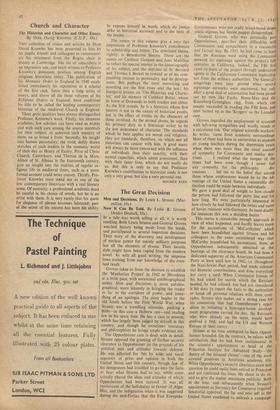Church and Character
Tilts collection of essays and articles by Dom David Knowles has been presented to him by his pupils, friends and colleagues to commemor- ate his retirement from the Regius chair in history at Cambridge. The list of subscribers is an impressive one, and bears witness to Professor Knowles's dominant position among English religious historians today. The publication of his Monastic Order in England in 1940 estab- lished immediately his reputation as a scholar of the first rank. Since then a long series of essays, and above all the three volumes of his Religious Orders in England, have confirmed his title to be called the leading contemporary historian of the medieval Church in England.
Three great qualities have always distinguished Professor Knowles's work. Firstly, his immense erudition; few scholars can have read so widely and with such care among the source materials for their subject, or achieved such mastery of them, on so broad a front. Secondly, his insight into human personality; the vivid, deftly drawn sketches of such leaders in the monastic world of their day as Henry of Eastry, Prior of Christ Church, Canterbury, and Thomas de la Mare, Abbot of St. Albans in the fourteenth century, give an insight into the realities of regular re- ligious life in medieval times, such as a more formal account could never convey. Thirdly, Pro- fessor Knowles must stand out as one of the few contemporary historians with a real literary sense. Of necessity, a professional academic must be careful in his choice of words, but he is an artist with them. It is very rarely that his quest for elegance of phrase becomes laboured; part of the secret of his success has been his ability
to express himself in words which do justice alike to historical accuracy and to the taste of the reader.
The essays in this volume give a very fair impression of Professor Knowles's contribution to scholarship and letters. The dominant theme, rightly, is Benedictine history. There are the essays on Cardinal Gasquet and Jean Mabillon to reflect his special interest in the historiography of his subject, and the sketches of St. Bernard and Thomas a Becket to remind us of his com- manding interest in personality and its develop- ment. But perhaps the most interesting and revealing are the first essay ,and the last: his inaugural lecture on 'The Historian and Charac- ter,' and his memoir of Cuthbert Butler, whom he knew at Downside as both teacher and abbot. As the first reveals, he is a historian whose first interest is not in the causes of historical events, but in the effect of events on the character of those involved. As the second shows, he regards his primary duty as a historical writer to be the just assessment of character. The standards which he here applies are moral and religious; they are standards, therefore, on which not all historians can concur with him. A good many will always be more concerned with the influence of individuals than their sanctity, with their mental capacities, which admit assessment, than with their inner lives, which do not easily do so. But this is only to say that Professor Knowles's contribution to historical study is not only a very great, but also a very personal one.
MAURICE KEEN


































 Previous page
Previous page